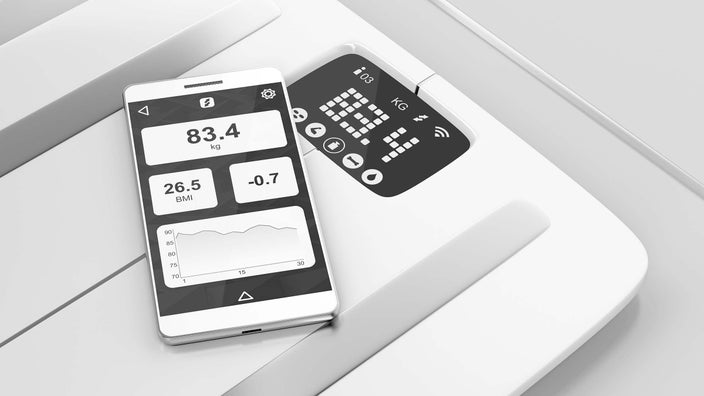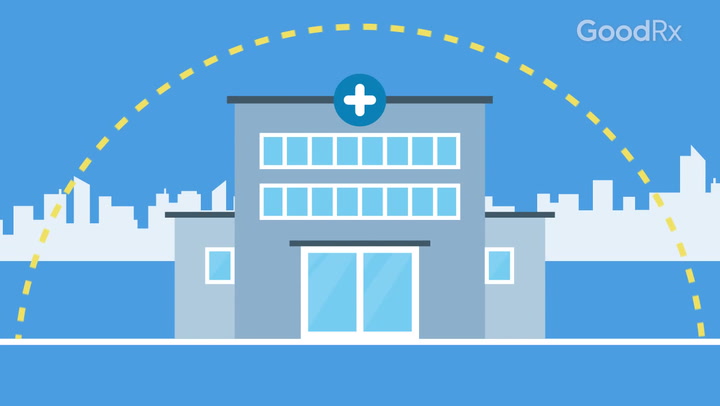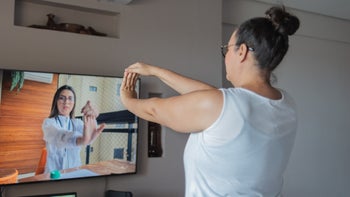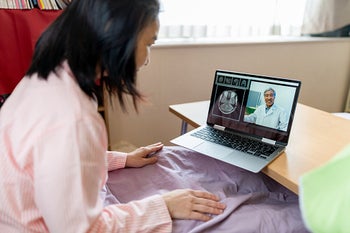
The Benefits of Smart Scales and How They Measure Body Composition
Key takeaways:
Smart scales offer multiple ways to measure your health besides just your weight.
Smart scales can vary on what they can track, their costs, and their accuracy.
Which smart scale is best for you will depend on what you’re tracking and your personal needs.

The scale. A universal device found in millions of American homes, often nestled in a snug place in the bathroom. It sits there, reminding you to check in every once in a while. It may be a love/hate relationship for many, but it has its uses.
For many people, tracking body weight is an important tool for making lifestyle changes. It can also be helpful to track weight loss progress, especially if a person is at risk for certain medical conditions, like Type 2 diabetes. But in an era of digital health, what if the scale could measure more than just body weight?
In this article, we’ll talk about some advances in upgrading the scale for the modern era — the smart scale.
Save over 40% on Qsymia with GoodRx
Discover the once daily Qsymia for weight management. Qsymia is for adults and children 12-17 in combination with a healthy diet and regular exercise.

What is a smart scale?
Smart scales have been around for over a decade. The first wi-fi connected scale came to market in 2009. Initially, smart scales didn’t measure anything different than a traditional scale. But they allowed for the transfer of body weight information to a smartphone app. This created a digital record of a person’s body weight.
However, these scales have evolved and taken on more features over time. Nowadays, many scales can collect lots of health information from you simply by standing on it.
Examples of health information that can be measured by smart scales include:
Body fat percentage
Basal metabolic rate
Body mass index (BMI)
Muscle mass
Fat mass
Body water percentage
Bone mass
Some smart scales can also allow personalization with different modes, such as allowing you to track weight differently if you’re pregnant or measure a baby's weight. Some can even help you with endurance training with athlete modes.
All of this data is usually linked with an app made by the scale’s manufacturer. But that data could also be shared with other smartphone health apps if you’d prefer. This may help you track your activity and see weight loss progress in one app.
What’s the point of a smart scale?
For many people, a smart scale may not be needed. But if you regularly track other health information on your smartphone, it could be another tool to help gain more insight about your overall health.
Read more like this
Explore these related articles, suggested for readers like you.
Some people like the fact that smart scales measure more than just weight. For instance, if a smart scale measures heart rate, you can see that data on your phone along with other health data.
Some obesity treatment programs and weight loss programs have used smart scales to monitor progress and reported positive results for their members. The data collected can help show both the smart scale owner and their healthcare provider how much weight they’ve lost. This can help healthcare providers create individualized weight loss plans better suited for each person.
Smart scales that track more than BMI
If you’re looking for a smart scale that tracks more than weight and BMI, you’ve come to the right place. We’ve put together a list of several smart scales with their features and costs. All of the scales measure weight and BMI. Most also track body composition. Body composition is body fat percentage, muscle mass, and bone mass.
| Name of Scale | Features | Cost |
|---|---|---|
| Eufy Smart Scale |
|
$39.99 |
| Fitbit Aria Air |
|
$49.95 |
| Garmin Index S2 |
|
$149.99 |
| iHealth Nexus Wireless Body Composition Scale |
|
$79.99 |
| QardioBase 2 |
|
$149.99 Flexible spending account (FSA) eligible with a letter of medical necessity |
| Renpho Smart Body Fat Scale - Basic |
|
$27.99 |
| Renpho Smart WiFI Bluetooth Body Fat Scale |
|
$44.99 |
| Withings Body |
|
$59.95 |
| Withings Body+ |
|
$99.95 |
| Withings Body Cardio |
|
$149.95 |
| Wyze Scale |
|
$19.99 |
How do smart scales work?
In general, many smart scales work similarly to traditional scales when measuring weight. If you provide your height, they can also calculate BMI. Then they send that information to a smartphone app. Not all smart scales need a WiFi connection to work. Some use Bluetooth to send the information to your smartphone instead.
Many scales estimate body composition through bioelectrical impedance analysis (BIA). Smart scales measure BIA by having two electrodes that send a painless electrical current through your left and right feet. It’s important to have your socks and shoes off to use this feature. Body composition is then determined by how this electric pulse flows through your body.
The electric current sent out is safe for most adults and children. But if you have a pacemaker or other implanted device, BIA could interfere with it. Don’t use a smart scale if you have one of these devices.
Are smart scales accurate?
Many of the scales mentioned in the table above list their accuracy on their websites. This is something to compare before purchasing a smart scale.
A small study compared three smart scales’ body composition measurements to that of a dual-energy x-ray absorptiometry (DEXA) scan. A DEXA scan is a highly accurate test performed by healthcare providers to measure body composition.
The study found that none of the smart scales tested were as accurate as a DEXA scan for measuring body composition. The study authors didn’t want this to stop people from using smart scales. Instead, they just wanted people to be aware that there is a difference in accuracy.
In comparison, another small study compared a smart scale to a traditional scale at a hospital. They found that there were no significant differences in body weight readings between the two scales. This study suggests that a smart scale can be an accurate way to measure weight at home.
It’s always best to discuss scale accuracy with your healthcare provider before purchasing at at-home scale.
Are smart scales worth it?
Whether a smart scale is worth it for you is a personal decision. Considering that a traditional scale is generally inexpensive, paying more for extra features may or may not be worth it.
As listed in the table earlier, some smart scales are available for around $20. So not all smart scales are expensive. Generally speaking, the more features a smart scale offers, the higher the price may be.
Future smart scale developments
Recently, there’s been a push for smart scales to have more medical features. This is due to the expanding telehealth market. Your healthcare provider could ask you to use a smart scale to track data that you’d share online with them. This could lower the number of times you’d have to travel to their office.
One smart scale that may be available soon is the Withings Body Scan connected health station. This smart scale will have all the features discussed earlier but with added sensors. One additional feature includes tracking your heart for rhythm problems, like atrial fibrillation. It would also be able to track nerve activity in your feet to check for problems, like neuropathy.
While these features may be highly attractive, cost may be a factor. This scale is expected to cost about $300. You may want to talk to your healthcare provider to see if they think that cost is warranted for you.
The bottom line
Smart scales have greatly evolved over the past decade. On top of tracking body weight, they have various extra features to help give a bigger picture of your overall health. Smart scales may be beneficial for you, depending on what you want to measure. Expect more developments with smart scales in the future with even more features than what’s available now.
Why trust our experts?



References
Bennett, G. G., et al. (2018). Effectiveness of an app and provider counseling for obesity treatment in primary care. American Journal of Preventive Medicine.
Boston Magazine. (2016). Can a scale really measure your heart health?
Brockmann, A. N., et al. (2020). Frequency and consistency of self-weighing to promote weight loss maintenance. Obesity (Silver Spring, MD).
DEXA Scan. (n.d.). How it works.
Frija-Masson, J., et al. (2021). Accuracy of smart scales on weight and body composition: observational study. JMIR mHealth and uHealth.
Jensen, M. D., et al. (2018). 2013 AHA/ACC/TOS guideline for the management of overweight and obesity in adults. Circulation.
Lin, A. L., et al. (2021). Body weight changes during pandemic-related shelter-in-place in a longitudinal cohort study. JAMA Network Open.
MobiHealthNews. (2020). FitTrack launches Beebo, a smart scale for moms-to-be.
MobiHealthNews. (2022). Withings’ Body Scan smart scale measures segmented body composition, nerve activity.
Qardio. (2021). Understanding your QardioBase measurements.
RENPHO. (2021). RENPHO body fat scale: normal mode or athlete mode, which is right for you?.
Ross, K. M., et al. (2016). Concordance of in-home ‘smart’ scale measurement with body weight measured in-person. Obesity Science and Practice.
Thomas, J. G., et al. (2017). Weight loss and frequency of body-weight self-monitoring in an online commercial weight management program with and without a cellular-connected ‘smart’ scale: a randomized pilot study. Obesity Science and Practice.
UC Davis Health. (n.d.). Body composition.
Withings. (n.d.). About bioelectrical impedance analysis and body composition measurement.
Withings. (n.d.). Body Scan connected health station.




























